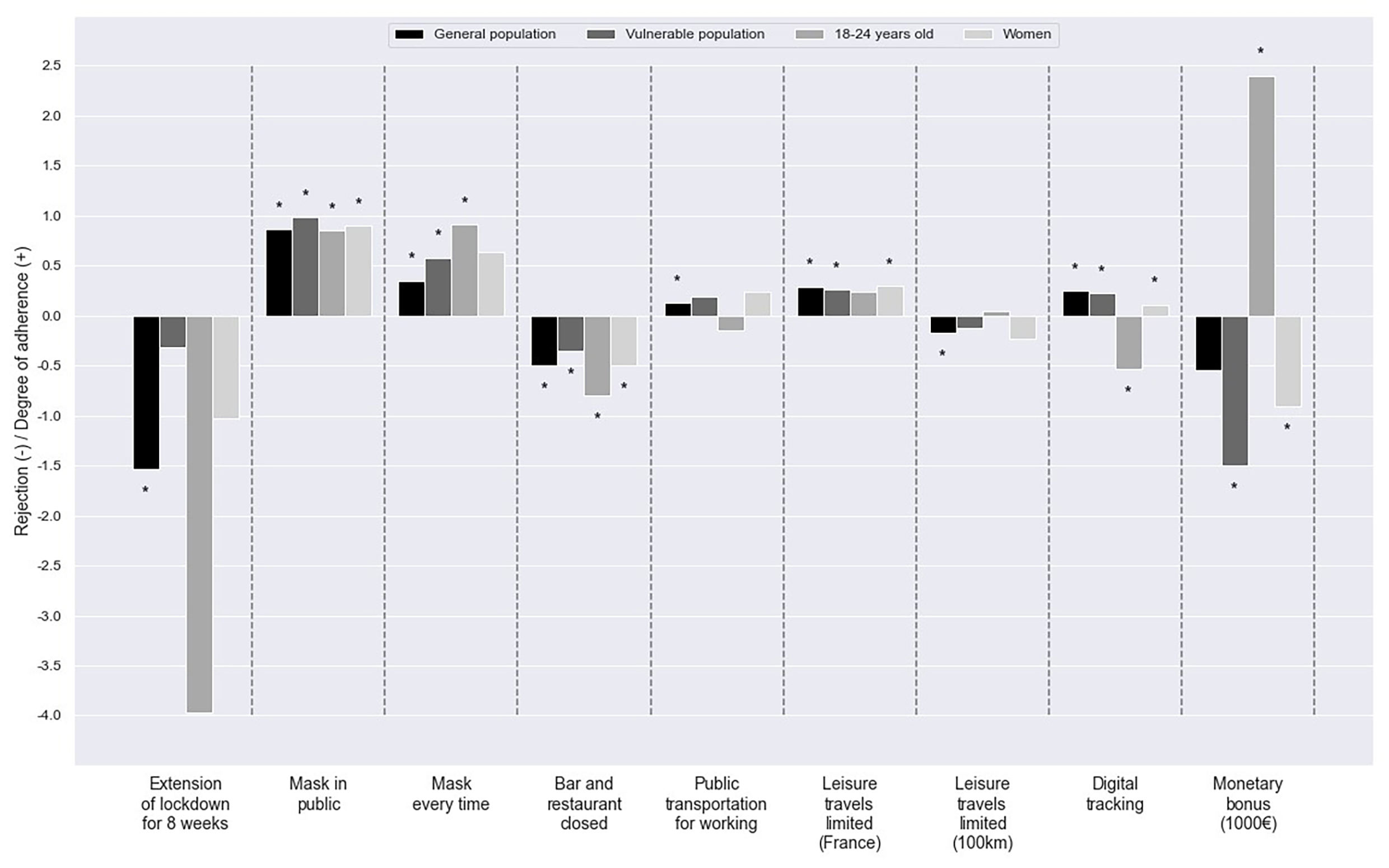Currently, the whole world is applying policies designed to combat the Covid-19 pandemic, like lockdowns, international travel restrictions, sub-sectoral closures (bars, restaurants), cuts to public transportation. While all these restrictions can be effective in controlling the epidemiological dynamics, they also need to be assessed in terms of their acceptability by the populations, whose preferences should matter, particularly after months of efforts, and the new requirements of lockdown in several European countries, despite these efforts.
In May 2020, a team of researchers from Aix-Marseille Shool of Economics (AMSE), the Center for Environmental Economics (CEE-M) and the Bureau d'Economie Théorique et Appliquée (BETA) designed a web-based survey and conducted it on a representative sample of the French population. One of the objectives was to assess acceptance of measures among the main anti-covid strategies. Using a Discrete Choice Experiment (DCE), they elicited population preferences regarding various “menus” of Covid-19 epidemic control policies. Preference-ranking analysis was conducted for the population as a whole, but also differentiating between subgroups (clinical vulnerability, age groups, gender).
The scientific paper is published in The Lancet Public Health.
Main Results
Masks, public transport restrictions, and digital tracking were deemed acceptable by the general population. Additional weeks of lockdown, restaurant closures, and excessive leisure travel restrictions were not. We also found that the aversion to extra weeks of lockdown is more than proportional (“quadratic shape”): the longer the duration of the lockdown, the more it is rejected with intensity. This draws a picture of a French population who perceive the prophylactic measures relatively well, not just as constraints but as necessary evils to be weighed up against the risk of overall lockdown, a prospect which most view negatively.
Subpopulation analyses demonstrate that the acceptability of some strategies depends on personal characteristics. Clinically vulnerable people (affected by a chronic condition, self-reported) show better tolerance of lockdown, a little more acceptance of the mask, a little less disutility from restaurant closure. However, these differences remain slight, indicating either altruism by the non-vulnerable towards the vulnerable, or weak singularity of the vulnerable in terms of attitude toward risk.
Young people are the most dissonant segment of the population -possibly because they are less concerned by the health risk. They are clearly in favour of the financial compensation that is rejected by all other segments of the population (The financial compensation was introduced as an all-purpose transfer, rewarding all the efforts requested). This suggests that financial incentives could be an efficient instrument if targeted towards the young, who would adhere more to restrictive policy options when compensated.
Knowing how people rank the various Covid-19 prophylactic measures is a prerequisite for designing sets of appropriate epidemic-control programmes, a challenge that many countries will face again before the arrival of a vaccine. This study alerts on the need of more inclusive anti-covid policies and suggests routes to better match the preferences of subgroups, with the aim of a -plausibly- improved adherence from them.
Degrees of adherence observed in the survey, regarding various “menus” of Covid-19 epidemic control policies, differentiating between subgroups (clinical vulnerability, age groups, gender) © 2020 The Authors / Bruno Ventelou
More info :
► Read the article "Quelles mesures sanitaires les Français sont-ils prêts à accepter ?", The Conversation.fr, le 30 décembre 2020.
Press review
►Read in Le Journal du Dimanche : "Coronavirus : masques, traçage... quelles mesures sanitaires les Français sont-ils prêts à accepter?", 31rst december 2020
► Read in la Tribune : "Quelles sont les mesures sanitaires acceptables pour les Français ?", 1rst january 2021
► Read in Yahoo ! actualités : "Covid : ces mesures sanitaires que les Français sont prêts à accepter", 5th january 2021
► Read in Slate fr : "Jusqu'où sommes-nous prêts à accepter les restrictions anti-Covid?", 14th january 2021
"Covid-19 : de l'hypervigilance à la lassitude, comment les mesures de lutte contre la pandémie jouent avec notre santé mentale", Franceinfo:, par Marie-Adélaïde Scigacz, le 22 mars 2021 : read the article
"La question de la santé mentale devenue incontournable dans la crise sanitaire", Weka, par la rédaction Weka, le 25 mars 2021, read the article
"Ne pas reconfiner, est-ce contre-productif pour la santé mentale?", Le Huffington Post, par Antoine Beau, le 1 avril 2021 : read article




